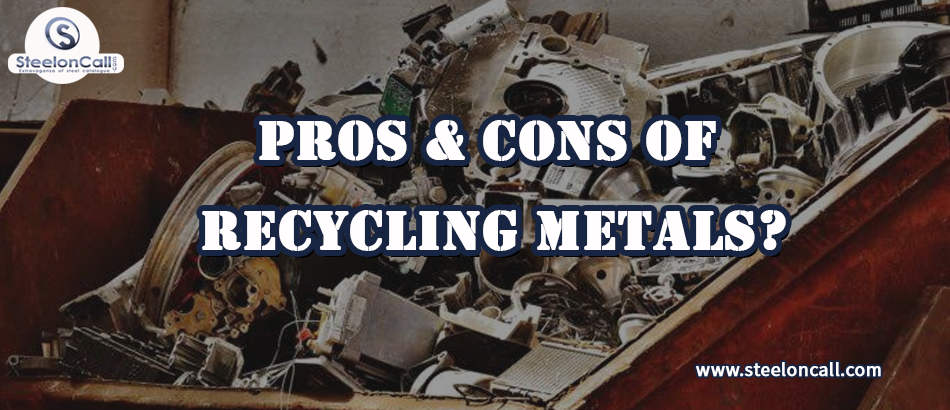Pros & Cons of Recycling Metals. Briefly Explain

The electronic building materials, furniture, gadgets, batteries, transportation, and almost everything around us are metals. Stone carvers and artisans even utilize them for their specialty pieces. To make all these metal items, we need crude ore, which is made available from extracting or metal recycling. Now Steeloncall is going to distinguish all the pros and cons of recycling Metals.
Pros of Recycling or Scrap Metals
Non-iron based metals like aluminum and steel can have probably the most recycling rates. Some of the statistics show that 48.2 percent of aluminum cans are reused, along with 62.8 percent of steel cans. Of the 250 million tons of waste that enters the municipal stream, metals represent 21 million tons or 8.4 percent.
Steel can be recycled again and again without losing any of its strength. A few materials can be recycled, but they become slightly weaker each time they experience the procedure until they should be thrown away. Since steel holds its natural characteristics, it very well may be utilized in everything in its recycled structure.
Metal recycling offers support to an industry that does work and helps our local economy. Some of the metals are valuable, numerous organizations pay individuals and organizations for their utilized metals, and one can find a recycling center phoenix Arizona that buys metal, non-ferrous metals, copper, aluminum, etc.
A few minerals, particularly aluminum, are so beneficial to recycle that companies pay people and organizations for their utilized metal, as indicated by Waste Care Corporation. Recycled aluminum cans alone produce $800 million every year, which frequently goes to benevolent organizations. Metals are generally and completely recyclable, which decreases the ecological effect of mining for metal
One has to know that the creation of new steel requires the utilization of scrap steel. In needed to say that, up to 25% of scrap is necessary for the production of new steel products. If everyone were to discard this metal when it was never again required, we would be experiencing a shortage. Also, selling scrap can make you some money.
For example, recycling aluminum saves 92% of the energy used to create new aluminum from virgin metal, and likewise, 90% for copper and 56% for steel is saved. To make it far superior, recycling a solitary aluminum can save enough energy that can control a 60-watt light for over 4hours.
Some of the significant benefits of recycling the metals are like
- 40% reduction in water use.
- 75% savings in energy.
- 90% savings in raw materials used.
- 86% reduction in air pollution.
- 76% reduction in water pollution.
- 97% reduction in mining wastes.
Cons Of Recycling Or Scrap Metals
A few metals, especially aluminum, corrupt after each reuse cycle, which implies that the last items may shift in quality.
Aluminum, steel, and different metals should be physically isolated from other recyclable materials, for example, plastic and paper, as indicated by Waste Care. Metals, particularly aluminum, tend to degrade after each reuse cycle, so items utilizing reused metals can change in quality. However, most metals never arrive at a point where they are no longer recyclable. Recycling metals still uses energy, a considerable amount. Many reused metals are impure, which implies that they should either be separated or reused (a complex task) or are utterly unsuitable for specific tasks. Recycling facilities may have unacceptable working conditions hence expanding laborers being presented to poisons. Recycling of metal is adding to the world and the earth positively as it permits profitability as well as natural sustainability.

